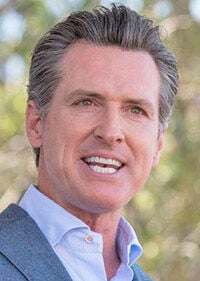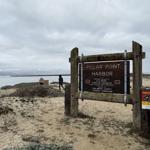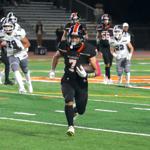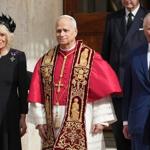Sen. Anna Caballero is one of California’s most influential lawmakers, since she is in charge of a committee that decides in secret to kill hundreds of bills each year, often at the behest of the governor’s administration.

Gavin Newsom
But even though Caballero is the powerful chair of the Senate Appropriations Committee and regularly works with the governor’s team, Gov. Gavin Newsom still vetoed seven of her bills this year, the most of any lawmaker.
“I do tough bills,” Caballero, a Democrat who represents the Merced area, told CalMatters. “So sometimes I get lucky, and other times, it’s disappointing. And, you know, you learn to live with it.”
Her vetoed bills include one that aimed to reduce emissions at state ports, another that sought to add oversight for metal shredding facilities and one that sought to train police to investigate foreign governments that target immigrant communities.
In his veto messages, Newsom described those bills as unnecessary since state agencies were already doing similar work. That’s one of the more common themes in Newsom’s 123 vetoes from this legislative session that he finished signing earlier this month. He used the word “duplicative” 16 times, according to an analysis of CalMatters’ Digital Democracy database.
The analysis highlights how Newsom uses his veto pen to assert authority over a Legislature his fellow Democrats control while rejecting bills he deems too costly, redundant or politically risky. Newsom cited fiscal implications dozens of times in his veto messages, reflecting the challenges of a tough budget year. This year’s vetoes also gave him a chance to throw some shade at Newsom’s biggest enemy: President Donald Trump.
Newsom mentioned Trump by name three times in his vetoes, and he cited Trump’s “hostile economic policies” in almost a quarter of his veto messages, 28 times.
“With significant fiscal pressures and the federal government’s hostile economic policies, it is vital that we remain disciplined when considering bills with significant fiscal implications that are not included in the budget, such as this measure,” Newsom wrote, in vetoing Caballero’s bill that sought to exempt hydrogen fuel from sales taxes.
He used a nearly identical line to veto three other Caballero bills, including a measure to provide tax credits for medical equipment, a bill that would have provided grants for carbon dioxide removal and another that sought to incentivize biomass power plants.
The vetoes represented just a small percentage of what Newsom’s did with the 917 bills that were sent to his desk this year. He vetoed just 13.4% of them, a slightly lower rate than previous years, according to Chris Micheli, an adjunct professor at McGeorge School of Law and a veteran lobbyist who keeps detailed statistics on the Legislature.
It certainly wasn’t all vetoes for Caballero. Newsom also signed 10 of her bills into law.
Zombie bills return for a second veto
There was another theme in Newsom’s vetoes: Spiking bills he’d previously vetoed.
He did that six times.
As CalMatters reported, even if a bill gets vetoed one year, lawmakers often bring the legislation back again — often with wording identical to the previous version.
Previously vetoed measures are especially likely to be resurrected if well-funded lobbying groups that donate heavily to politicians are pushing for a new law.
That was the case with two bills Newsom axed for the second time this year.
One was a union-backed bill by Democratic Assemblymember Dawn Addis of San Luis Obispo that sought to make it easier for farmworkers to win workers’ compensation claims against employers for heat-related illnesses. The other was a previously vetoed measure by Democratic Assemblymember Esmerlda Soria of Merced that sought to allow community colleges to offer bachelor’s degrees in nursing. Nurses unions, hospitals and community colleges supported the bill.
Newsom noted those bills were “nearly identical” to measures he previously killed, and he cited the same reasons.
Newsom again spiked a bill that would require counties to create multidisciplinary behavioral health teams, a proposal to force insurers to pay for menopause treatment, a reparations bill and a measure to fund a study on women veterans’ mental health.
First-year lawmaker Democratic Assemblymember John Harabedian, representing the Pasadena area, had five vetoes this year, the second most in the Legislature. They were mostly related to health insurance and the fallout from last winter’s devastating wildfires in Los Angeles County.
Recommended for you
Newsom vetoed his bill that would have required insurers to pay for up to 12 mental health visits for people living where there has been a recent wildfire. Another would have created a state-led disaster housing task force in Los Angeles County. The governor also vetoed a measure that sought to speed up patients getting the care their doctors recommended.
“Big, transformative policies often take multiple attempts, and I’m proud to keep pushing forward to serve my constituents,” Harabedian said in an emailed statement.
Newsom signed four of Harabedian’s bills.
None of Democratic Assemblymember Ash Kalra’s bills were vetoed this year — for the first time in the San Jose lawmaker’s nine-year legislative career. He had 12 signed into law.
That included a bill aiming to prevent foreign labor contractors from exploiting their workers that was similar to a measure Newsom vetoed before. Kalra said he narrowed the bill to cover only farmworkers to address Newsom’s concerns.
“You have to be persistent,” he said. “Sometimes it takes three, four or five times, or in the case of the foreign labor contractor bill, seven years.”
How other lawmakers avoid vetoes
Other lawmakers also got a lot of their bills past Newsom’s veto pen.
Democratic Santa Ana Sen. Tom Umberg had Newsom sign 16 of his bills, the most behind San Francisco Sen. Scott Wiener, who had 21. As the Senate Budget Committee chair, Wiener is the lead author of mandatory budget bills that skew his totals.
Umberg’s bills include one prohibiting streaming providers such as Netflix from playing overly loud advertisements; another to prohibit Elon Musk and others from hosting lotteries to gin up partisan voter registration, one intended to stop puppy mills and an audit of the state’s troubled bar exam.
Umberg, a former federal prosecutor and attorney nearing the end of his term, said his success is due in part to him serving in the Legislature off and on since the 1990s. He’s served under four different governors, so he said he knows what they’re looking for.
“I hope that my years of experience provide some benefit and some expertise in legislating and how to work a bill through the process and how to get a bill signed,” he said.
Newsom vetoed one of Umberg’s bills this year, a measure that would have added new price-gouging protections and penalties in disaster zones. Newsom didn’t like that the bill also would have allowed the Legislature to override a governor’s authority on disaster declarations.
Republicans are vastly outnumbered in the Legislature and not as many of their bills even reach the governor’s desk, so it stands out that Assemblymember Josh Hoover, a Republican representing the Folsom area, had the most bills signed among GOP lawmakers, with nine. Hoover is out of the country this week and wasn’t available for an interview, his spokesperson said.
Republican Assemblymember Laurie Davies had seven of her bills signed, the third-most among Republicans.
Davies’ bills weren’t particularly controversial and didn’t involve partisan politics. They included a measure that requires schools to provide educational materials to prevent drownings. Another requires the state to tell those who file complaints about a drug and alcohol treatment center the outcome of their complaint. Another of her proposals prohibits selling equipment to modify electric bicycles so they no longer classify as an e-bike.
Davies, who represents a competitive swing district in the Oceanside area, said she wants her bills to solve problems, not take partisan hits that almost certainly won’t get signed into law under a Democratic administration.
“We don’t run bills for social media clicks or cable news invites,” she said.
Newsom did veto one of her bills this year, a measure that sought to make battery storage plants beef up their fire safety plans. Davies opposes a proposed battery storage facility in her district.
Newsom’s veto message used one of his favorite words: “Duplicative.”
“This bill is largely duplicative of existing requirements and mandates a new procedural requirement that risks delaying critical clean energy projects,” he wrote.































(0) comments
Welcome to the discussion.
Log In
Keep the discussion civilized. Absolutely NO personal attacks or insults directed toward writers, nor others who make comments.
Keep it clean. Please avoid obscene, vulgar, lewd, racist or sexually-oriented language.
Don't threaten. Threats of harming another person will not be tolerated.
Be truthful. Don't knowingly lie about anyone or anything.
Be proactive. Use the 'Report' link on each comment to let us know of abusive posts.
PLEASE TURN OFF YOUR CAPS LOCK.
Anyone violating these rules will be issued a warning. After the warning, comment privileges can be revoked.